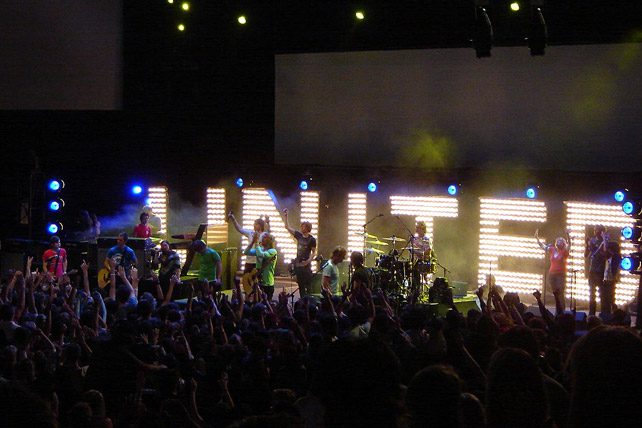If you’re not familiar with the many scandals that have plagued Hillsong as of yet, I can only say, “Google it.” Just compiling a sequential set to tell the unfolding story would be a blog unto itself. Suffice it to say, one of the world’s largest and most influential network of churches has found itself drowning in sexual and financial misconduct, not to mention a culture within the church that both facilitated it and, when confronted, attempted to cover it up.
This leaves churches that both love and use Hillsong music in a dilemma: Should they keep using the music? At Meck, we’ve made our decision. But for many, it won’t be easy.
The music of Hillsong has filled our churches for decades, from “Shout to the Lord” in 1994 to the more recent “Oceans.” Currently, four of the 10 most popular worship songs come out of Hillsong: “The Goodness of God,” “What a Beautiful Name,” “Who You Say I Am,” and “King of Kings.”
There will be many who say that the sin of the leadership should have nothing to do with the power and efficacy of a song. There is truth to that, and historical precedent in the history of the Church.
Under the Roman emperor Diocletian, there was enormous persecution of the early Christian Church. It began in 303 and didn’t end until the conversion of Constantine. During that time, Christian books were burned and churches demolished. Those Christian leaders who turned their books over to be burned were labeled traditores, which is the basis for our word “traitor,” which literally means “those who handed over.”
Then came the dilemma: Once Christianity stopped being persecuted, did the traditores still have the right to function as ministers? Of particular interest were the sacraments. Did whatever grace and meaning involved in overseeing a sacrament depend on the person who did it or on the sacrament itself?
Two groups, with very different ideas, emerged. The first were the Donatists, named after their leader, Donatus. They felt that lapsed bishops were deprived of all ability to administer the sacraments or act as a minister of the Christian Church. They had left the church and could no longer administer the sacraments properly. To their thinking, anyone who was a traditor under persecution needed to be replaced by someone who had stayed faithful, regardless of whether repentance was evidenced.
The other view was taken by a group that came to be known as the Catholics (not to be confused with the formalized Catholic Church but rather “catholic” meaning “the church universal”). They felt like the person could, by their repentance, be restored to grace and continue in their role.
The two sides were at a stalemate until the towering figure of Augustine stepped in. He maintained that every Christian is a sinner, and that whatever holiness there is in the Church is not found in its members, but rather in Christ. He argued that the Donatists placed far too much emphasis on the human agent, instead of on Christ as the One who works through such things as the sacraments.
In the annals of Church history, Donatism was labeled a heresy, and it was maintained that the validity of the sacraments is independent of the merits of those who administer them. This did not mean that just anyone could administer the sacraments – they must stay within the confines and authority of the Church and in the hands of those ministers the Church authorizes – but the efficacy of the sacrament itself does not lie in those authorized hands.
But with the music of Hillsong, there is a very important difference: Every time a church uses one of their songs, financial remuneration goes to Hillsong. Not just the individual(s) who wrote the song, but also to the church itself. And when a person singing a Hillsong song at church goes out and downloads it, this again helps Hillsong financially.
When all matters of Hillsong debauchery began to break across many Hillsong churches, I had a “wait and see” mentality. Meaning, let’s see how the church leadership responds to it all, particularly the latest incident with the central leader, Brian Houston. Unfortunately, that response was to ask all Hillsong leaders to simply sign NDAs (non-disclosure agreements).

